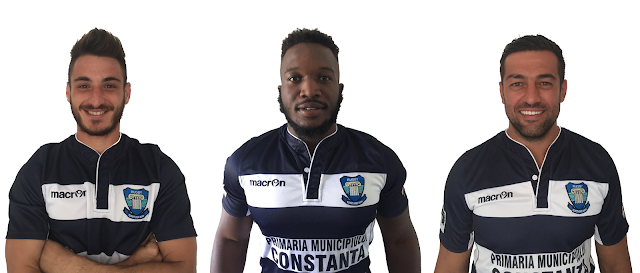Let’s Talk About Rugby
INTERVIEW WITH ACS TOMITANII CONSTANȚA PLAYERS
 |
| Credit: SuperLiga CEC Bank |
 |
Let’s explore rugby through their experiences!
INTERVIEW
Q: How did they discover rugby?
A: Adrian took after his father, Gheorghe
Ion – renowned,
international player, nicknamed ‘Tarzan’, one of the legends of Romanian rugby.
Ngoni has always been a sports enthusiast, having attended a rugby game
one day, when he decided that this was the sport he wanted to pursue. Interestingly,
Ionuț, among his
classmates, was the only one who hasn’t been initially considered for the rugby
team, due to his slimmer figure – “Instead of discouraging me, it ambitioned me!
Eventually, I was the only one from my class who went on to the ‘Sports High School’ and was
selected later on for a professional team”.
Q: How do they prepare for games?
A: Within the pre-season time-frame, before
the beginning of the championship training is very intense, with a main
emphasis on strength. Training is done twice a day, every day (Mon – Fri), but during
this period, even more sessions are needed. Following strength practice, the focus
falls on technique. Lastly, on the game week, training less is better,
so as not to overwork the system, which could lead to underperforming – Adrian
tells us. Ionuț follows a strict, consistent schedule before games,
which helps him achieve his best potential, while Ngoni mentioned drinking
plenty of water, prioritising carbs, and importantly,
getting eight hours of sleep on the night before a match.
 |
| Credit: SuperLiga CEC Bank |
Adrian: “I am still nervous, even
after all this time. Being the captain is a great responsibility – bringing
everyone together in and out of the field, for better or for worse. Once I
start playing however, I regain my composure and stay focused, while enjoying
the game”
Ngoni: “I feel a mix of emotions, a
need to fulfil my goals, a desire to do my best. All these bring back memories of my journey in rugby. I thank
God for each opportunity and play for the glory of God.”
Ionuț: “There
is a mix of unique feelings, incomparable to any others. I’m scared, yet excited
– it is like I am doing something for the first time, I don’t know what to
expect, yet I give all I’ve got – it’s the feeling I love the most.”
Q: How has rugby impacted their daily lives?
Adrian: “There is a common saying that ‘rugby is
a hooligan’s game played by gentlemen’ – I think that it does apply to me, as
I learnt how to respect and enjoy time with competitors regardless of the
sometimes rough interactions on the field. Above all, rugby kept me away from potential
vicious circles growing up, having chosen to follow a healthier, more ethical path.”
Ngoni: “I learnt how to adequately
plan my day, set and pursue goals, never quit, and became very disciplined.”
Ionuț: “It has taught me about solidarity, group thinking, teamwork, how to adapt and understand society. Most importantly, it has motivated me to prioritise my health.”
Q: What are their main goals as rugby players?
Adrian: “I would
like to play in the 2023 World Cup, after which I am planning to retire” – his
career reaching 26 years this year.
Ngoni: “My aim is to play for my
native country, Zimbabwe, in the 2023 World Cup.”
Ionuț: “I work towards reaching the highest level in my country – for
now.”
 | |
|
A: “Romania used to have a flourishing rugby culture, keeping up with powerful countries. Unfortunately, while they kept progressing, we stagnated and started regressing – thus, we no longer hold a renowned name in the rugby world” – highlights Adrian. There are only six teams left at the top which are not enough to create a competitive scene, and hence growth in a rather big country like Romania. Rugby is rarely played in schools, while the lack of professional leagues is not attracting sponsors, creating difficulties for local players. There is a lot of real talent, nevertheless, a lack of opportunities for development compared to 1992 – 2000, when Romania held a great name internationally – add Ionuț and Ngoni.
Q: Next, we have asked for a few development suggestions. Their answers:
A: In Spain, for example, a lot of rugby is being played,
especially among young people, creating a ‘healthy-, quality-focused’
development, alike South Africa, most recent World Cup winners, where many
under eight year olds take on the sport. This provides a great opportunity for
the younger generations to learn from the elders, professional league players,
whilst adopting a sense of competitiveness and drive towards greater
achievements. Thus, a potential measure that could be taken would be to invest
more into youth rugby teams, beginning to introduce the sport into schools and
universities, which would create a culture and education about the sport into
one’s country.
 |
| Credit: Romanian Rugby Federation |
A: “Japan has advanced greatly in sports generally, alongside rugby. During the Handball Championship, they have beaten our team, which was considered more likely to win at the time. Even more in rugby, they are still growing, having large, engaged audiences, and a considerable budget, which draws attention and many talents – both young, as well as already well-known athletes. As players are really well payed, many stars choose to play for Japan before retiring” – Adrian points out.
Q: Lastly, we gathered few questions that our interviewees wanted to address, about rugby in Japan.
Adrian: “I heard that while coached by Eddie Jones, the national team’s
first training session took place at 5 A.M. – I am curious whether this is
indeed true? Also, since rugby is developing so much – I would like to know
what is ‘their secret’, besides, surely, their professional and loyal attitude.”
Ngoni: “I am curious whether rugby
is compulsory in schools, and how they managed to become so good all of a
sudden – what kind of techniques they have; what is their know-how?”
Ionuț: “Do they follow a diet? If so, what does it consist of, on a
weekly basis?”
 | |
|
LUNCH TIME!
After our interview, we have dived even further into the local
rugby culture, by joining our team to the canteen - where
meals prepared specially for their needs as athletes are being prepared. During
our feast, there was a dynamic, family-like atmosphere, of genuine care, trust,
and support, seasoned with jokes and a talkative spirit. This has indeed
demonstrated the “brotherhood” and “team spirit” that are so praised in rugby.
Thank you for your time and attention! Stay tuned and join us on our next journey across Europe! What’s it going to be next?


Comments
Post a Comment